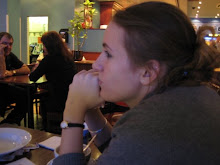Some of these are just funny (and yes, they do enjoy taunting Cambridge), others hit closer to home:
Oxford is on the whole more attractive than Cambridge . . . and the traveller is therefore recommended to visit Cambridge first or to omit it altogether if he cannot visit both.
-Baedeker's Great Britain (1887)
What distinguishes Cambridge from Oxford, broadly speaking, is that nobody who has been to Cambridge feels compelled to write about it.
-A. A. Milne
Who can . . . walk up the Oxford High Street on a sunny morning or linger on a clear night in Radcliffe Square and not be aware of something more authentic than the life of everyday?
-The Character of England (1950)
Folded in a druidical mist, viewed from a sodden hillside through a screen of dripping branches, seen against a clear dawn, its towers like diacritical marks upon the lines of a text, or coyly changing its colours as evening comes on, Oxford beheld from a distance is as elusive and capricious as it was when we were there within it. Matthew Arnold spoke of it, twice and memorably, as dreaming, but the only reveries were Arnold's, those of a flesh-and-blood Oxonian eternally lacing his quest for gravity with delicious inventions. Oxford never dreams, it is far too wakeful and predatory, too eager to take us for its own. Turning to look back from Cumnor or Iffley or as the Paddington train pulls out, each of us reads the chosen signals. A warning? An insult? An invitation or an embrace?
-Jonathan Keats in Drawings and Sketches of Oxford (1983)
"It doesn't matter what the professors teach, it's what the place teaches..."
-Quoted in Richard Tames' A Traveller's History of Oxford (2003)
Practices for Disturbing Times
4 years ago

No comments:
Post a Comment